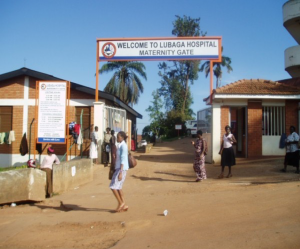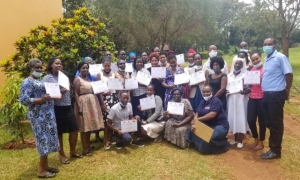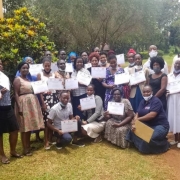Developing mental health care at Lubaga Hospital in Kampala.
Lubaga hospital is one of the largest private-not-for-profit hospitals in Kampala. It is a busy general hospital in the centre of Uganda’s capital city. Lubaga also have outreach clinics in some of the poorer parts of the city.

They are working toward becoming a regional referral hospital and so they are looking to increase the specialities in the hospital. This will include psychiatry.
Some of us from Jamie’s Fund visited the hospital in November 2019. We were given a wonderfully warm welcome by the senior staff, who were all there to meet us, together with an array of refreshments. We were impressed by the thoughtful and compassionate leadership of the hospital. They really wanted to develop an effective mental health service, but were uncertain how to go about it. How good it is for Jamie’s Fund to be partnered with such an enthusiastic group.
Following our visit, the management team were keen to run an mhGAP workshop, which we were pleased to fund. Two of the senior staff attended the “training the trainers” workshop run by our colleague, Joshua Ssebunnya. Their hospital workshop was very well organised by deputy Principal Nursing Officer Lilian Nakayiza, and they trained 30 general staff from the hospital.
As part of the follow up, they set up a group in the hospital which meets monthly to discuss how mental health care is progressing. An outcome from one of their meetings was the realisation that there were still many staff in the hospital who were not really aware of mental illness. They asked If we could please fund another mhGAP workshop, so that more staff could be trained. We were happy to support this training as well, and they trained another 30 members of staff.
Jamie’s Fund has been aware for some time that there is a need to do more to sensitise the leaders in the local communities about mental illness and epilepsy. This is so that they become aware that these illnesses are not infectious or due to demon possession, and – importantly – that they can be treated. Working with our colleagues in Uganda we have developed a one-day course for leaders in the community such as local government leaders, religious leaders, teachers, and health volunteers.

The staff at Lubaga Hospital were keen to pilot this new training. They asked if they could run three courses, as they had identified 90 people who were in leaders in the surrounding communities. The courses ran well and there was much discussion about different aspects of mental illness and how it affects people they know. Inevitably there wasn’t enough time to cover all the different aspects of mental ill health and epilepsy, but the participants greatly appreciated the information and the opportunity to discuss the issues.
As a result of these workshops, staff from the hospital have been requested to talk to other groups about mental ill health and its treatment.
We very much appreciate the interest and support of the hospital management team in developing mental health care. This support is such a key element of service development, and makes it much more likely that the new services will succeed and grow. Excitingly, there are plans to send one of the staff to train as a psychiatric clinical officer, which will increase the skills and capacity for good mental health care in the hospital.
Lilian Nakayiza and Ewan Wilkinson

